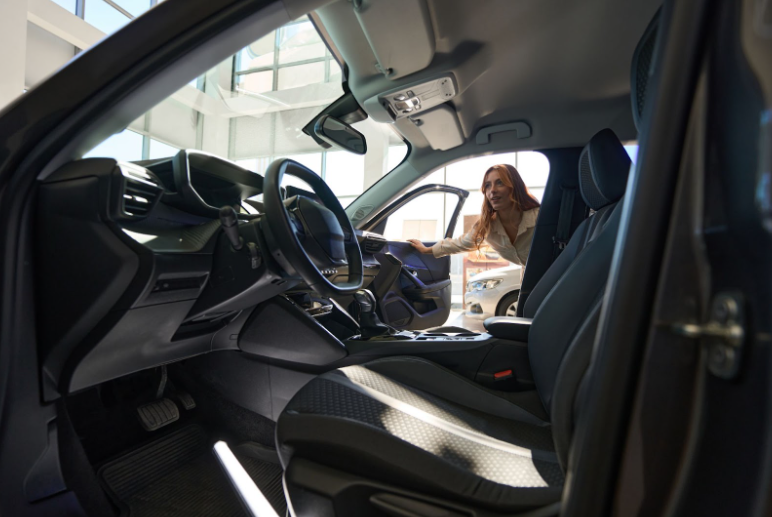The Ultimate Guide to Choosing the Perfect Car: 8 Factors to Consider When Choosing The Right Car

How to Choose the Right Car
Choosing the right car involves more than just picking a model that looks good. It's about finding a vehicle that fits your lifestyle, meets your needs, and aligns with your budget.
Factors to Consider when Choosing the Right Car
- Assess Your Needs:
- Daily Commute: Consider the distance, traffic conditions, and frequency of your commutes.
- Family Requirements: Think about passenger capacity, cargo space, and safety features.
- Recreational Use: If you enjoy outdoor activities, consider vehicles with off-road capabilities or ample cargo space.
- Set Your Budget:
- Determine how much you can afford to spend on a new car.
- Include considerations for insurance, maintenance, fuel, and registration fees.
- Decide Between Leasing and Buying:
- Leasing: Lower monthly payments and access to newer models.
- Buying: Ownership benefits, no mileage restrictions, and potential resale value at the dealership.
- Consider Long-term Ownership Costs:
- Maintenance and repair expenses for the car you want.
- Depreciation rates.
- Fuel efficiency and related costs.
Steps to Finding the Perfect Car

- Use Edmunds Car Finder Tool:
- Utilize online tools to narrow down your choices based on your preferences and requirements while car shopping.
- Research and Compare:
- Compare different makes and models.
- Read reviews and ratings from experts and consumers.
- Test Drive:
- Evaluate comfort, handling, and performance.
- Schedule a test drive for multiple vehicles to make a well-informed decision.
- Explore Used Car Options:
- Benefits of buying a used car include lower costs and less depreciation.
- Compare the conditions and history of used cars you want.
- Consider certified pre-owned vehicles for additional assurance.
Setting Your Budget for a New Car
Determining your financial limits is crucial when setting a budget for a new car. Start by considering your income, savings, and credit score to get a realistic picture of what you can afford. Factor in all costs associated with the purchase, including monthly payments, interest rates, and loan terms. It's important to balance your needs with your budget, prioritizing essential features over luxury additions. Keep in mind that the total cost of owning the car you want extends beyond the purchase price, so include estimates for insurance, maintenance, fuel, and registration fees. By carefully assessing your financial situation and making informed decisions, you can ensure that you stay within your budget while still finding a car that meets your needs and suits your needs.
Steps To Assess Your Needs and Budget for a New Car
Setting a budget for a new car is essential to ensure that your purchase is financially sustainable. Begin by getting a clear picture of your financial situation, including your income, savings, credit score, and car payments. This will help you determine how much you can realistically spend on a new vehicle. When setting your budget, consider the following financial aspects:
- Purchase Price:
- Determine the maximum amount you can afford to spend on the car itself. This includes the sticker price, taxes, and any additional fees.
- Down Payment:
- Decide how much you can put down upfront when car shopping. A larger down payment can reduce your monthly payments and the overall interest paid over the life of the car-buying loan.
- Monthly Payments:
- Calculate how much you can afford to pay each month. This should include the loan principal, interest, and any associated car-buying fees.
- Interest Rates and Loan Terms:
- Shop around for the best interest rates and loan terms. A lower interest rate or a shorter loan term can save you money in the long run.
- Insurance Costs:
- Research insurance premiums for the models you’re considering. Insurance costs can vary significantly based on the car’s make, model, and your personal driving history.
- Maintenance and Repairs:
- Estimate ongoing maintenance costs and potential repair expenses for the car you want. Some vehicles have higher maintenance costs than others, so it's important to factor this into your budget.
- Fuel Efficiency:
- Consider the fuel efficiency of the vehicle and estimate your monthly fuel costs based on your driving habits and local fuel prices.
- Registration and Fees:
- Include the cost of registration, licensing, and any other applicable fees. These can vary depending on your location and the vehicle you choose.
Determining if You Should Lease or Buy a New Car
Weighing the Pros and Cons of Buying vs. Leasing a Vehicle: Deciding whether to buy or lease a car depends largely on your driving habits and financial situation. Buying a car means you own it outright after the loan is paid off, and you can keep it for as long as you want. This option often makes sense if you plan to drive the car for many years, allowing you to avoid monthly payments after the loan is paid. However, leasing may be more attractive if you prefer driving newer models and want lower monthly payments. Leasing typically involves mileage restrictions and no ownership at the end of the lease term, but it allows you to drive a new car every few years with potentially lower maintenance costs.
Calculating Depreciation and Potential Future Costs for a Car Purchase: When considering buying a car, it’s important to understand depreciation trends for different models. Cars typically lose value over time, but some models, such as certain sedans and SUVs, depreciate more slowly than others. Researching depreciation rates can help you choose a vehicle that will retain its value better, providing potential savings if you decide to sell it in the future. Additionally, plan for future maintenance and repair costs, which can vary significantly depending on the car's make, model, and age. Budgeting for these expenses in advance can prevent financial surprises down the road.
Consulting Automotive Experts on the Best Option for Your Situation: Making an informed decision about buying or leasing a car can be challenging, so seeking advice from automotive experts and financial advisors is beneficial. Experts can provide insights into the best vehicles for your needs and budget, while financial advisors can help you understand the long-term financial implications of buying versus leasing. Additionally, use online tools and resources to compare different options and gather as much information as possible before making your decision.
Considering Long-term Ownership Costs for a New Car
- Depreciation: Understand the depreciation rate of different models.
- Consider the potential resale value.
- Maintenance and Repairs: Estimate ongoing maintenance costs.
- Research common repair issues for the models you’re considering.
- Fuel Efficiency: Compare fuel efficiency ratings.
- Calculate potential fuel costs based on your driving habits.
Exploring Options for a Used Car
Benefits of Buying a Used Car
- Cost Savings: Used cars are generally less expensive than new cars, allowing you to save a significant amount of money upfront. This lower price can also reduce the amount of loan you need to take out, lowering your monthly payments and interest costs.
- Lower Depreciation: New cars depreciate quickly, losing a large portion of their value within the first few years. Used cars have already undergone this initial depreciation, so their value decreases more slowly, preserving more of your investment.
- Lower Insurance Costs: Insurance premiums for used cars are typically lower than for new cars. This is because the replacement cost of a used car is lower, reducing the insurer's risk.
- Wider Selection: When buying used, you have access to a wide range of makes, models, and years. This variety allows you to find a car that fits your specific needs and preferences, often at a more affordable price.
- Reduced Fees: Used cars often come with lower registration fees and taxes. In many regions, these costs are based on the car's value, which is lower for used vehicles often found at dealerships.
- Certified Pre-Owned Programs: Many manufacturers offer certified pre-owned (CPO) programs that provide additional peace of mind. CPO vehicles are thoroughly inspected, refurbished, and come with extended warranties and other benefits.
Research and Compare Different Makes and Models for Used Cars
When researching and comparing different makes and models, it's essential to utilize online resources to gather comprehensive information. These platforms allow you to compare prices, features, and reviews, helping you identify the best options within your budget and preferences. Additionally, checking vehicle history reports is crucial as they provide valuable insights into a car's past, including any previous accidents and maintenance records. This due diligence ensures you make an informed decision, choosing a vehicle that is reliable and well-maintained.
Factors to Evaluate during a Test Drive of a Used Car
Start by checking for any unusual noises or vibrations, which could indicate underlying mechanical issues. Test all features and functions of the vehicle to ensure they work properly and meet your needs. Additionally, assess the overall condition and comfort, paying attention to seating, visibility, and ergonomic layout. A thorough test drive helps you gauge the vehicle's performance, comfort, and suitability for your lifestyle, ensuring you choose a car that meets your expectations and requirements.
Deciding Between Buying and Leasing a Car

Weighing the Pros and Cons of Buying vs. Leasing a Vehicle
When deciding between buying and leasing a car, it's crucial to weigh the pros and cons of each option. Buying offers the advantage of eventual ownership, allowing you to build equity in the vehicle over time. You have the freedom to customize and sell the car at any point. However, leasing provides lower monthly payments and the opportunity to drive a new car every few years without the hassle of selling it. On the downside, leased cars come with mileage restrictions and fees for excessive wear and tear. Assessing your financial priorities and long-term goals will help determine which option aligns best with your needs.
Calculating Depreciation and Potential Future Costs for a Car Purchase
Calculating depreciation and potential future costs is a key consideration when opting to purchase a car. New cars depreciate rapidly in the first few years, losing a significant portion of their value. Understanding this depreciation curve can help you estimate the vehicle's future resale value and make an informed decision on whether buying makes financial sense for you. Additionally, factor in maintenance, insurance, and financing costs over the vehicle's lifespan to get a comprehensive view of ownership expenses. Comparing these costs with leasing terms will further clarify which option offers better financial stability and flexibility.
Consulting Automotive Experts on the Best Option for Your Situation
Consulting automotive experts can provide invaluable insights into the best option for your specific situation. Professionals in the industry can offer advice based on current market trends, your driving habits, and financial considerations. They can explain the intricacies of leasing terms, such as residual values and mileage restrictions, and help you navigate the complexities of car financing. By seeking expert guidance, you gain clarity on the advantages and potential pitfalls of both buying and leasing, empowering you to make a confident decision that aligns with your lifestyle and budgetary constraints.
Get detailed and up-to-date vehicle information by embracing CarsXE’s APIs today. Contact us Now!